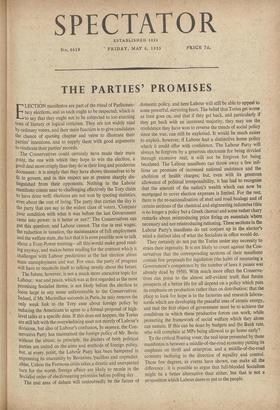THE PARTIES' PROMISES
ELECTION manifestos are part of the ritual of Parliamen- tary elections, and as such ought to be respected, which is to say that they ought not to be subjected to too exacting tests of literary or logical criticism. They are not widely read by ordinary voters, and their main function is to give candidates the chance of quoting chapter and verse to illustrate their parties' intentions, and to supply them with good arguments to vindicate their parties' records.
The Conservatives could certainly have made their main point, the one with which they hope to win the election, a good deal more crisply than they do in their long and ponderous document : it is simply that they have shown themselves to be fit to govern, and in this respect are at present sharply dis- tinguished from their opponents. Nothing in the Labour manifesto comes near to challenging effectively the Tory claim to have done well; elections are not won by quoting statistics, even about the cost of living. The party that carries the day is the party that can say to the widest class of voters, 'Compare your condition with what it was before the last Government came into power; is it better or not?' The Conservatives can put this question, and Labour cannot. The rise in real wages. the reduction in taxation, the maintenance of full employment and the welfare state,The fact that it is even posSible now to talk about a Four-Power meeting—all this \ would make good read- ing anyway, and makes better reading for the contrast which it challenges with Labour predictions at the last election about mass unemployment and war. For once, the party of progress will have to reconcile itself to talking mostly about the future.
The future, however, is not a much more attractive topic for Labour : war and peace, which was at first regarded as the most promising Socialist theme, is not likely before the election to loom large in any sense unfavourable to the Conservatives. Indeed, if Mr. Macmillan succeeds in Paris, he may remove the Only weak link in the Tory case about foreign policy by inducing the Americans to agree to a formal proposal of high- level talks at a specific date. If this does not happen, the Tories are still left with the overwhelming asset not merely of Labour's divisions, but also of Labour's confusion. In essence, the Con- servative Party has maintained the foreign policy of Mr. Bevin without the abuse; in principle, the Jeaders of both political parties are united on the\aims and methods of foreign policy. but, at every point, the Labotir Party has been hampered in expressing its unanimity by Bevanites.1:•acifists and unpredict- ables. Unless the Formosa crisis takes a drastic and unexpected turn for the worse, foreign affairs are likely to recede in the Socialist order of electioneering priorities before polling day.
The real area of debate will undoubtedly be the future of domestic policy, and here.Labour will still be able to appeal to some powerful, surviving fears. The belief that Tories get worse as time goes on, and that if they get back, and particularly if they get back with an increased majority, they may use the confidence they have won to reverse the trends of social policy since the war, can still be exploited. It would be much easier to exploit, however, if Labour had a distinctive home policy which it could offer with confidence. The Labour Party will always be forgiven by a generous electorate for being divided through excessive zeal; it will not be forgiven for being becalmed. The Labour manifesto can throw away a few mil- lions on promises of increased national assistance and the abolition of health charges; but, even with its generous allowance of political irresponsibility, it has had to recognise that the amount of the nation's wealth which can now be mortgaged to cover election expenses is limited. For the rest, there is the re-nationalisation of steel and road haulage and of certain sections of the chemical and engineering industries (this is no longer a policy but a Greek chorus) and some rather chary remarks about reintroducing price fixing on essentials where necessary and not reintroducing rationing. These sections in the Labour Party's manifesto do not conjure up in the elector's mind a distinct idea of what the Socialists in office would do.
They certainly do not put the Tories under any necessity to strain their ingenuity. It is not likely to count against the Con- servatives that the corresponding sections of their manifesto contain few proposals for legislation (the habit of measuring a Government's competence by the number of laws it passes was already dead by 1950). With much more effect the Conserva- tives can point to the almost self-evident truth that future prospects of a better life for all depend on a policy which puts its emphasis on production rather than on distribution; that the place to look for hope is in the factories and research labora- tories which are developing the peaceful uses of atomic energy, and that the first object of ,government must be to achieve the conditions in which these 'productive forces can work, while protecting the framework of social welfare which they alone can sustain. If this can be done by budgets and the Bank rate, who will complain at MPs being allowed to go home early?
To the critical floating voter, the real issue presented by these manifestos is between a middle-of-the-road economy putting its emphasis on thrift and enterprise, and a middle-of-the-road economy inciiniug in the direction of equality and control. Those few degrees, as events have shown, can make all the difference : s it is possible to argue that full-blooded Socialism might be a better alternative than either, but that is not a proposition which Labour dares to put to the people.










































 Previous page
Previous page